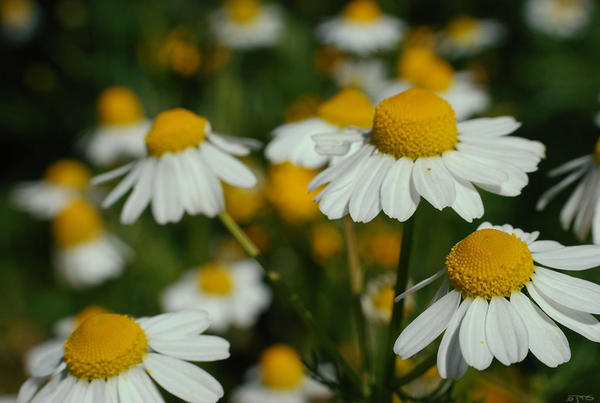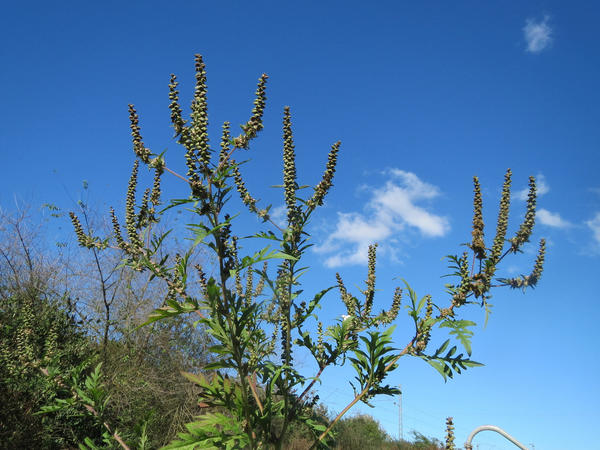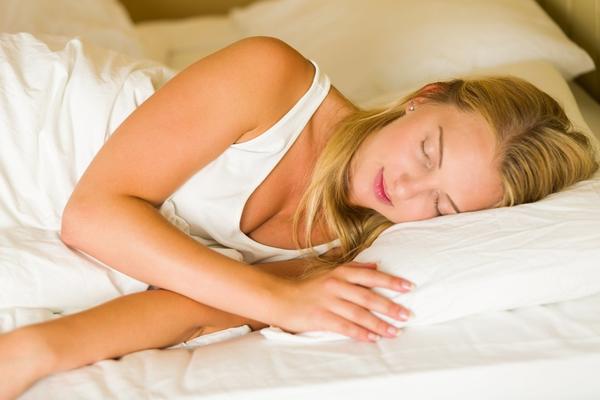Chamomile Tea and Sleep
Last Updated: Oct. 11, 2018
 German Chamomile (Matricaria chamomilla) is the species whose flowerheads are dried for use in chamomile tea. Photo © Eran Finkle, CC BY 2.0.
German Chamomile (Matricaria chamomilla) is the species whose flowerheads are dried for use in chamomile tea. Photo © Eran Finkle, CC BY 2.0.Chamomile Tea and Sleep
Chamomile, typically German chamomile (Matricaria recutita), is one of the most widely-consumed caffeine-free herbal teas, as well as a common ingredient in herbal blends. It is traditionally consumed as a bedtime drink or a sleep aid, or at any time of day for its general calming effects.Here we summarize what is known about the possible benefits of chamomile tea on sleep, as well as its safety when used for this purpose.
Chamomile tea is popular and widely used as a sleep aid.
A 2008 study in Quebec [1] found that it was the most commonly-used natural sleep aid there. It is also one of the most popular herbal teas overall: on our site, chamomile has the most reviews of any pure herb, and the page on chamomile is also the most popular of our pages on specific herbs. Interestingly, it is not the most popular herb flavor-wise; the top-rated teas in our herbal tea category include a few chamomile blends, but no examples of the pure herb, which tend to be rated lower than blends with other ingredients.A huge portion of commercial herbal blends contain chamomile. Chamomile is the first ingredient in Celestial Seasonings' Sleepytime, as well as in Bigelow's Sweet Dreams, and Tazo Calm. It is also commonly included as a minor ingredient in blends, especially those marketed for their relaxing properties. Nearly every tea company with a large selection offers either a chamomile blend or a pure chamomile tea, often offering both.
Chamomile has a long history of traditional use.
The history of medicinal use of chamomile is ancient; according to the traditional roots institute, its use dates to 1550BC in Egypt, and it has been used in Europe since the first century C.E. One review dates its use back even earlier, covering the past 5000 years.[2] Promoting calm and reducing anxiety, and treating insomnia and other sleep problems, are only some of the many traditional uses of this herb. It has been used both settle the stomach and treat digestive problems, including ulcers, diarrhea, and nausea.Externally, it has been used to treat wounds, burns, skin irritation, eczema and other rashes, and a variety of other conditions. These uses may relate to its established antimicrobial properties.
Research on chamomile tea as a sleep aid is hopeful but inconclusive.
A 2010 review [2] noted an absence of clinical trials on chamomile tea as a sleep-inducer. There is some evidence that chamomile has anticonvulsant and CNS depressant effects, and that one of its constituents, apigenin, acts on the same receptors as benzodiazepines (a widely-used class of anti-anxiety medications.) Accordingly, extracts of chamomile were found to have a benzodiazepine-like sleep-inducing effect. Other compounds in the herb can also bind BDZ and GABA receptors, and may point to chamomile's calming effects having multiple mechanisms.A 2015 meta analysis [3] of randomized controlled trials of various herbs found no statistically significant evidence of any of the herbs studied, including chamomile, on sleep. This does not mean that it is not effective, merely that there has not been enough evidence to definitively establish that it is.
Improving sleep quality
Most of the research on chamomile has focused on its ability to induce sleep, but it is also sometimes recommended to improve the quality of sleep. There is much less research, however, on this. We found a single study from 2015 of sleep-disturbed postnatal women in Taiwan [4], as well as a 2014 study of people in nursing homes in Isfahan, Iran.[5] Both studies showed statistically-significant improvements on sleep quality, but we did not evaluate the quality of these studies, and even if they were high-quality there is a limited amount that could be concluded from isolated studies.Treating sleep apnea
Chamomile has also been recommended for treatment of sleep apnea, a potentially dangerous sleep disorder characterized by pauses in breathing and frequently associated with snoring. There is sparse research that has been carried out on the use of chamomile tea for this purpose; we found a single pilot study from 2011 [6] that showed promising effect sizes but no statistical significance. Ragweed (Ambrosia sp.) is closely related to Chamomile and may cause cross-reactivity. Be cautious when drinking chamomile tea if you have a strong reaction to ragweed or other aster-family plants. Photo © Andreas Rockstein, CC BY-SA 2.0.
Ragweed (Ambrosia sp.) is closely related to Chamomile and may cause cross-reactivity. Be cautious when drinking chamomile tea if you have a strong reaction to ragweed or other aster-family plants. Photo © Andreas Rockstein, CC BY-SA 2.0.Safety and side-effects
Most studies have found chamomile tea to be safe in the quantities it is typically consumed in herbal teas. The FDA lists it as "generally recognized as safe", a classification which refers to food use but not necessarily medicinal use in high doses and/or concentrated essential oils. WebMD lists vomiting as one potential side-effect, but notes that this is only associated with large doses. The herb may also have a mild blood-thinning effect due to containing the compound coumarin.Allergic reaction and cross-reactivity
People are frequently warned of the potential for allergic reaction to chamomile, as it is in the same family as ragweed, a common allergen, as well as Mugwort (Artemisia vulgaris), a related allergen. There have been documented cases of cross-reactivity, i.e. people allergic to these other plants also reacting to chamomile. One such case [7] involved anaphylaxis, probably due to cross-reactivity to Artemisia.Other medicinal uses or health effects
Promoting sleep is only one of the many medicinal uses chamomile has been studied for. Like many herbs, it is also known to have potent antioxidant and antimicrobial effects, and it may have anti-inflammatory, antimutagenic, antispasmodic, cholesterol-lowering effects as well. It is known to lower blood sugar, leading to its use in preventing or reducing harm from type II diabetes. It has also been used and studied for its effect on the digestive system, notably to reduce acid reflux or heartburn.Additional (non-chemical) effects of drinking chamomile tea
When consumed as an herbal infusion, chamomile may have additional benefits beyond the effects of its chemical components, associated both with the ritual of preparing a hot drink, and the drinking of a hot drink before bedtime. Taking time to brew and then drink a cup of herb tea before bedtime may itself be beneficial to sleep, especially if it is associated with reduction in screen-time or other activities that can be mentally agitating and/or expose a person to bright blue light. The warmth of the drink itself can also have a physically relaxing effect, and when sleeping in a cold room and bed, the heat can also help people feel more comfortable. This effect can be somewhat mitigated by a slight disruption in sleep if the extra liquid causes a person to wake up to need to use the bathroom.In summary
Chamomile is one of the most commonly-consumed herbal teas, and is both widely and traditionally used to promote calm and induce sleep. There have been a number of studies examining the effectiveness of chamomile tea for this purpose, but the research remains preliminary. Chamomile tea is safe for most people in the quantities consumed as an herbal tea, with a point of caution for people with allergies to ragweed, mugwort, or other closely-related plants.You can find more information about chamomile as well as listings and reviews of different sources of the herb on our main page for chamomile tea. You may also want to visit our page on chamomile blends, which includes caffeine-free herbal teas with chamomile as the main ingredient, but also including other ingredients, usually for flavor.
References
1. M. Montserrat Sánchez-Ortuño et. al., The use of natural products for sleep: A common practice?, Sleep Medicine, Vol. 10, No. 9, October 2009, Pages 982-987.
2. Janmejai K Srivastava et. al, Chamomile: A herbal medicine of the past with bright future, Molecular Medicine Reports, Vol. 3, No. 6, Nov. 2010; pp. 895–901.
3. Matthew J.Leach, Amy T. Page, Herbal medicine for insomnia: A systematic review and meta-analysis, Sleep Medicine Reviews, Vol. 24, Dec 2015, pp. 1-12.
4. Shao‐Min Chang, Chung‐Hey Chen, Effects of an intervention with drinking chamomile tea on sleep quality and depression in sleep disturbed postnatal women: a randomized controlled trial, Journal of Advanced Nursing, Vol. 72, No. 2, Feb 2016, pp. 306-315.
5. M Abdullahzadeh , SA Naji, The Effect of Matricaria Chamomilla on Sleep Quality of Elderly People Admitted to Nursing Homes, Iran Journal of Nursing, Vol. 27, No. 89, Aug 2014.
6. Suzanna M Zick, Preliminary examination of the efficacy and safety of a standardized chamomile extract for chronic primary insomnia: A randomized placebo-controlled pilot study, BMC Complementary and Alternative Medicine, Vol. 11, No. 78, 2011.
7. Javier Subiza et. al, Anaphylactic reaction after the ingestion of chamomile tea: A study of cross-reactivity with other composite pollens, Journal of Allergy and Clinical Immunology, Vol. 84, No. 3, Sep 1989, pp. 353-35.


